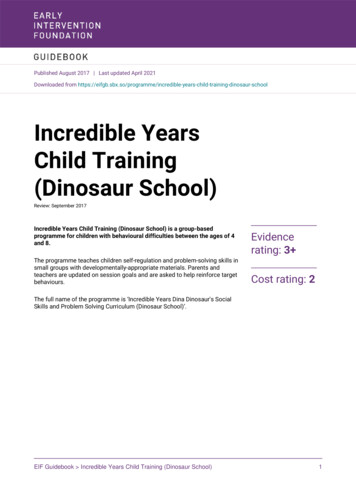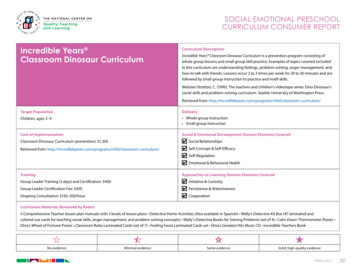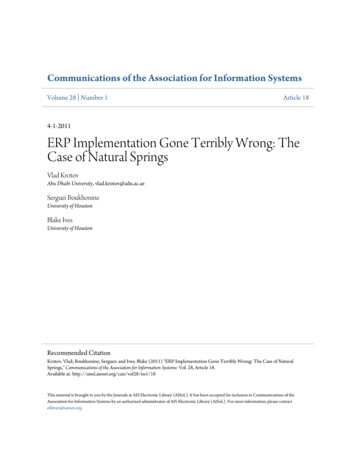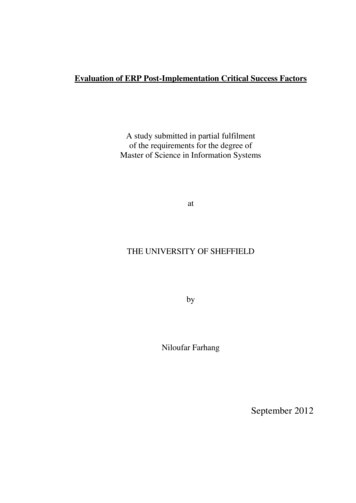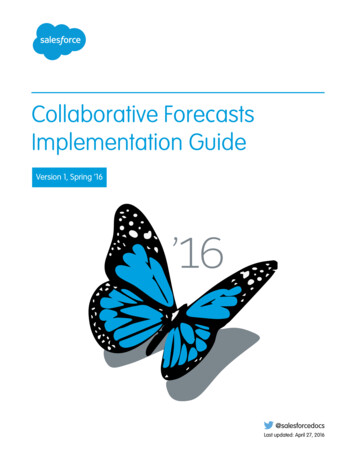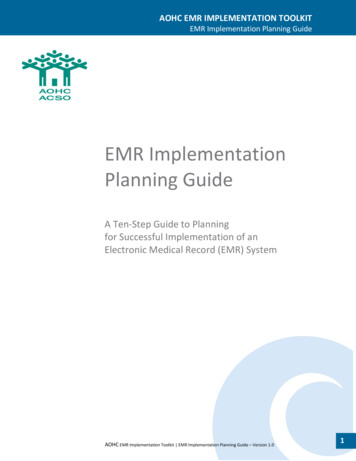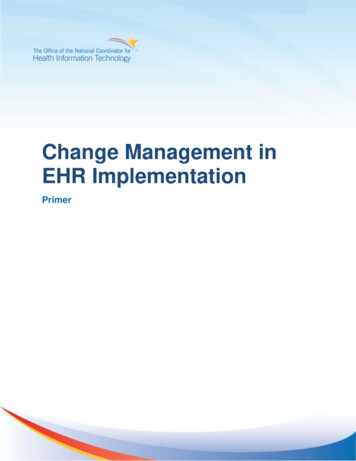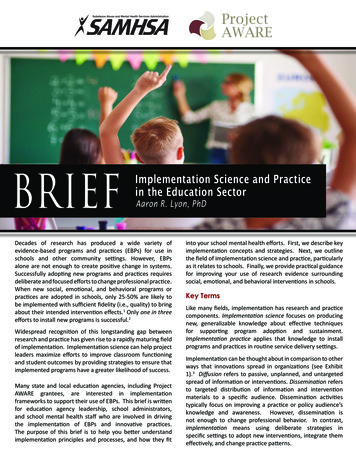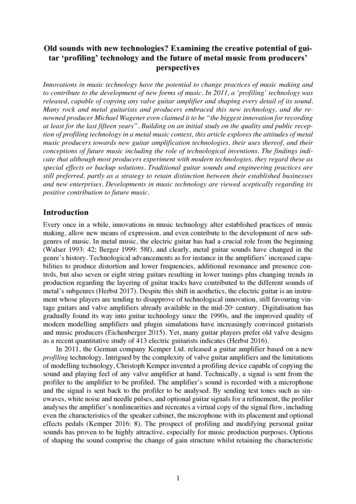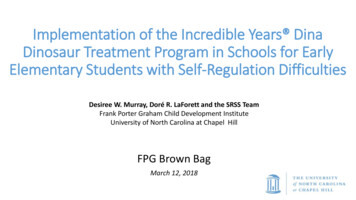
Transcription
Implementation of the Incredible Years DinaDinosaur Treatment Program in Schools for EarlyElementary Students with Self-Regulation DifficultiesDesiree W. Murray, Doré R. LaForett and the SRSS TeamFrank Porter Graham Child Development InstituteUniversity of North Carolina at Chapel HillFPG Brown BagMarch 12, 2018
Acknowledgements Support for this project is provided by IES (R305A150169) We appreciate our school district partners and especially ourcounselors! The SRSS Team: Alyson CavanaughCristin MontalbanoJessica James ReedMolly MarusRachel Mills-Brantley Jennifer KurianLaura Kuhn and DMAC And our co-I’s/consultants: Katie Rosanbalm, ChristinaChristopoulos, Mike Willoughby, Carolyn Webster-Stratton Many graduate and work study students as well as datacollectors who helped with implementation and assessment
DisclosuresDr. Murray is a trained mentor in the Incredible Years TeacherClassroom Management Program, and receives compensation fromcommunity organizations for providing trainings and consultation.The contents of this presentation are those of the authors and donot represent views or policies of the IES
Presentation Objectives1.Describe adaptations made and implementation supportsdeveloped for delivery of the Incredible Years (IY) DinaDinosaur program in schools2.Report implementation, fidelity, and satisfaction with programacross 3 years and 11 schools3.Summarize feasibility and “lessons learned” from the deliveryof this clinical program in schools
The Significance ofDelivering Mental Health Services in Schools 1 in 5 students has a diagnosable emotional orbehavioral disorder; only 20% of these willreceive any treatment Schools are ideal settings for enhancing access tomental health services, but fewer than halfprovide specific mental health programs Programs are often not evidence-based Evidence-based programs are often not delivered atfull dosage, are not well-integrated into schools, andschool staff receive little training
Potential Advantages of School-Based Delivery ofClinic-Based Social-Emotional Programs Access to students allows for more frequent meetings than typicallyonce per week clinic visits More opportunities for skills instruction & reinforcement Ideal for learning in young children May facilitate prompting & reinforcement of child skills throughoutthe day by school staff May provide opportunities for mental health staff to supportpositive school climate in the classroom & school May enhance effects of small group skills training for students
Self-Regulation Skills for Success (SRSS)Study Objectives Evaluate the Incredible Years Dina Dinosaur Treatment program Delivered in schools for 1st & 2nd graders with self-regulation difficulties Outcomes compared to services as usual in RCT design: Self-regulation skills (inhibitory control, emotion regulation, executivefunctioning) Disruptive and disengaged classroom behavior, discipline referrals Learning behaviors, academic competence, and report card grades Peer interactions and social competence
Theory of Change
Sample Demographics11 diverse schools recruited from 4 local districtsChapel Hill Carrboro 2015-16 (n 1), Lee County 2015-17 (n 1),Chatham County 2015-18 (n 2), Durham Public Schools 2016-18 (n 7)Total number students (across 3 years and all schools)172 (87 intervention; 85 comparison)Race/EthnicityAfrican American53.5% (n 92)White25.6% (n 44)Multiracial8.1% (n 14)Latino12.8% (n 22)Receive Free/Reduced Lunch72.1% (n 124)Demonstrate clinical difficulties by teacher ratings65.9% (n 91/138)*% with impaired peer relations43.4% (n 60)% with impaired academic/learning progress68.1% (n 94)% with impaired classroom behavior56.5% (n 78)*Not available for Cohort 1
The Incredible Years Dina DinosaurTreatment Program Developed for delivery in clinics: Small groups of 4-6 children meetweekly with 2 therapists 18-20 weeks of 2 hour sessions,delivered with parent program Teacher consultation recommended Instructional Methods:Developmentally-appropriate activelearning strategies: Puppets, videos, role-plays, and smallgroup activities Students learn: How to be successful in school Understanding feelings in self andothers Calming down when upset orfrustrated Getting along with friends andproblem-solving
SRSS Adaptations for Schools Co-leader model: SRSS mental health staffpartner with school counselors to deliver Delivery structure: Twice weekly 45 minutesessions during non-core instructional time 27 vs. 36 hours of targeted session time Very little difference in session content withexceptions of omitting “coached play” and possiblyfewer vignettes Intervention supports for skill generalization: Recess coaching (adds “dosage”) Teacher in-service meetings, consultation Parent educational meetings, phone calls
Implementation Considerations for School DeliveryScheduling & spaceGroup compositionVariability in schoolcounselor skillsTeacher stress/School climateAlignment between programphilosophy and school policy
Implementation Supports to Address ChallengesMonthly “coaching” in aProfessional LearningCommunity (PLC)Regular and proactivecommunication withschool leadershipDeveloped relationshipswith school districtliaisons
Video Demonstration What do you notice about the teaching strategies used by the groupleaders? How might this approach be effective withyoung children with self-regulation difficulties?https://hml.fpg.unc.edu/Play/3230
Preliminary Implementation Data* Child Group Sessions: Average of 36 sessions to complete all 18 lessons (range 32-40) 90% student attendance across 10 groups and 9 schools (range 15%-100% across students) 4 of 59 students did not participate/dropped out of the program Parent Attendance at 2-3 Meetings: 33-43% attendance rate (71% of parents came at least once) Recess Coaching: Average of 14 recess coaching sessions per student (range 2-20) Teacher Consultation: Average of 6 contacts per teacher (range 2-11) Teacher In-service: Average of 4.6 teachers/school at each session (25% without students in program)*Based on Years 1 & 2, includes 4 drop outs
n 11
1 extremely unhelpful, 4 neutral, 7 extremely helpfuln 11
Counselors’ Perceived Benefitsto their Learning and SEL Programming Increasing skills to manage behavior andmore effectively praise and ignore students Gaining understanding of challengingstudents and how to teach them socialemotional skills in “fun” ways Suggesting more effective strategies toteachers for challenging kids Modeling effective strategies for teachers Using intervention materials as part ofclassroom guidance
Teacher Satisfaction(n 48)
Teacher Satisfaction Teacher satisfaction and perceptions of child improvement related todecreased ratings of hyperactivity/impulsivity Improvements in teacher ratings related to: Ratings of 1:1 consultation with group leaders and teacher inservice Also by other indicators of satisfaction with the program Open-ended responses suggest: Teacher skill-building was most commonly identified as the most helpfulaspect of program involvement Increased opportunities for skill-building were suggestedKurian, LaForett & Murray (June, 2018). Teachers’ Satisfaction and Experience with a School-Based Intervention for Young Children’sSocial and Emotional Development. Poster to be presented at the National Research Conference on Early Childhood, Arlington, VA.
Parent Satisfaction(n 43/58 or 75%)Parents reported gains in a range of children’s skills such as emotion regulation, social skills, problem-solving andpaying attention; the most common area of improvement identified was emotion regulation
Parent Satisfaction 76% of variance in satisfaction predicted by: Perceptions of their child’s improvement (primarily) Relationship with group leaders Parenting strategies gained Satisfaction predicted higher parent meeting attendance (r .46) but lowerhome skill reinforcement (r -.61) Parental skill support at home was overall low (17%) and unrelated tomeeting attendance or phone contacts with group leaders Open ended responses suggest: Interest in greater support and communication with parents Interest in a longer program/more support for childKurian, Murray & LaForett (May, 2018). Parent Satisfaction with a School Mental Health Program: Predictors andImpacts on Parental Involvement. Poster to be presented at the Society for Prevention Research, Washington DC.
Implementation LessonsFidelity can be maintained in schools withsignificant implementation supportsConjoint delivery with counselors may increaseschool capacity for SEL interventions and createbroader impactSchool contextual factors likely influence programdelivery and perhaps efficacy
Implementation Research Questions(exploratory) To what extent does variability in fidelity and dosage influencestudent outcomes? To what extent does intervention group assignment contribute tooutcome variability? Are school characteristics (including climate) related to quality ofprogram delivery and student progress/outcomes? How will school counselors continue to use the program andenhance SEL programming at their schools?
Future School Delivery of IY Small Group External supports may be needed for full fidelity Consider conjoint delivery with contracted mentalhealth consultants Modifications for practice Deliver shorter modules matched to domains ofstudent impairment E.g., school success, emotion regulation, friendship School counselor could meet with 2-3 students at atime Utilize curricula as classroom guidance lessonsIncredible Years, Inc.
Implications for School-Based Deliveryof Other Clinical Programs Consider fit of the program with school philosophy and policies Discipline approaches could be a mismatch Include skill-based supports for parents and teachers Targeted programs may work less well without this support and/or stronguniversal positive discipline and social-emotional learning programming Strategically select students for group interventions Some students may need greater support than can be provided in a grouptherapy setting with a 1:2 or 1:3 ratio Consider group composition, e.g., possibility of negative peer dynamicsand benefits of including less-impaired peers
Questions?
An early look at outcomes (Coh1-2)
Our Questions How can we identify and evaluate for treatment predictors at thestudent and group level as well as a broader socio-contextual lensgiven our relatively small sample size? Child sex, severity, symptom profilesTeacher management skillsSchool variability
May enhance effects of small group skills training for students . Self-Regulation Skills for Success (SRSS) Study Objectives Evaluate the Incredible Years Dina Dinosaur Treatment program Delivered in schools for 1st & 2nd graders with self-regulation difficulti

